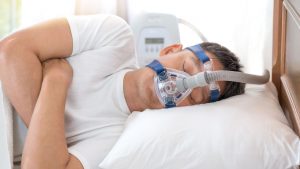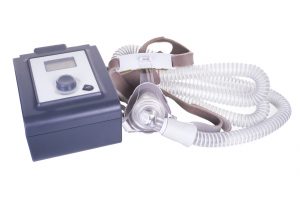For the past year or so, I’ve written extensively about the Philips Respironics (Philips) CPAP, BiPAP and ventilator FDA recalls. Hundreds of CPAP lawsuits have been filed against Philips. The primary problem comes from the foam material Philips uses to reduce the sound and vibration from these machines.
What’s Wrong With the Foam?
 These machines use polyester-based polyurethane (PE-PUR) foam that can break down into little bits and enter a user’s airway. The foam can also break down by off-gassing harmful chemicals that the user inhales. These can potentially cause health problems for users, such as:
These machines use polyester-based polyurethane (PE-PUR) foam that can break down into little bits and enter a user’s airway. The foam can also break down by off-gassing harmful chemicals that the user inhales. These can potentially cause health problems for users, such as:
- Cancer
- Dizziness/headaches
- Asthma
- Nausea
- Vomiting
- Cough
- Sinus infections
- Organ damage
- Irritation to the respiratory tract, skin and/or eyes
As you might expect, a lot of people who use these CPAP machines have filed lawsuits. There are so many cases that the courts have set up multi-district litigation, or MDL to handle many of them.
What’s Multi-District Litigation?
 An MDL is a consolidation of many related lawsuits so the court can more efficiently handle the cases and encourage the parties to settle. MDL usually takes place in federal court, although a state may have its own version of MDL litigation where cases from various counties are consolidated.
An MDL is a consolidation of many related lawsuits so the court can more efficiently handle the cases and encourage the parties to settle. MDL usually takes place in federal court, although a state may have its own version of MDL litigation where cases from various counties are consolidated.
MDLs are not the same as class-action lawsuits, though. Class-action litigation involves multiple plaintiffs in a single case. In contrast, an MDL consists of many individual cases that get their pre-trial matters (like discovery) handled by a single court.
MDLs are also sometimes more likely than class action lawsuits to settle, especially after several bellwether cases go to trial.
There are a variety of logistical and legal reasons why cases might end up in a class action lawsuit instead of an MDL or vice versa. The important thing to know concerning the Philips CPAP, ventilator and BiPAP recall litigation is that many (if not most) of the cases have been consolidated into an MDL.
The Philips CPAP, BiPAP and Ventilator MDL
The bulk of the CPAP, BiPAP and ventilator litigation against Philips is part of “MDL 3014 In Re: Philips Recalled CPAP, Bi-Level Pap, and Mechanical Ventilator Products Litigation” (MDL 3014). The Honorable Joy Flowers Conti from the U.S. District Court for the Western District of Pennsylvania is the presiding judge in this case.
The MDL is still in the very early stages, with plaintiffs still joining MDL 3014 and filing their complaints. The cases will progress with parties exchanging information through discovery and the court making decisions about discovery disputes.
Eventually, the court will schedule a few bellwether cases for trial. After the bellwether trials, the parties will see if a global settlement is possible. Depending on how these bellwether cases go, it could give the plaintiffs or defendants a major advantage during settlement talks.
If a global settlement isn’t possible, many of the cases could get sent back to their respective federal district courts where they were originally brought. The litigants can proceed with their lawsuits and settle or go to trial.
How Can I Find Out If Something Important Happens in MDL 3014?
 There are three ways to learn about recent developments. First, you can use an online search engine such as Google to look for any news stories, blog posts or articles about the case.
There are three ways to learn about recent developments. First, you can use an online search engine such as Google to look for any news stories, blog posts or articles about the case.
This is the easiest and quickest approach, but the problem is that unless there’s a big development in the MDL, such as a global settlement, you’re not likely to find much.
Second, you can go to the MDL 3014 court website, which is free and readily available to anyone with an Internet connection. Here, you’ll find court orders from the case. A court order usually reflects something “official” the court does, such as transferring a case, deciding a motion or scheduling a bellwether trial.
The drawback of going to the MDL 3014 website is that it only contains a small fraction of what’s going on in the case. This means it’s sometimes hard to understand the meaning or importance of a particular order.
For example, let’s say you see an order that indicates a judge has granted a plaintiff’s motion for sanctions against the defendant for not providing the requested discovery. But you don’t see each side’s legal briefs or memos arguing their legal positions. You also won’t see any other related motions that the court has yet to rule on.
In a way, seeing a court order all by itself is like being told the current score of a football game, but you aren’t told what quarter it is.
The third option for keeping up with MDL 3014 (or any other federal case) is to review the federal dockets. Dockets consist of a list of pretty much everything that happens in a case, organized by date. The docket will reflect pleadings, motions, an attorney’s entrance of appearance or a jury’s verdict after the trial.
If you want to know all the relevant updates to a particular case or MDL, looking at the dockets is the best approach. That being said, it’s not always the easiest way to learn about recent developments. This is because it can be difficult to understand the various bits of legal and court-specific jargon and codes that appear.
Another problem is that they’re not easily accessible by the public. Yes, anyone with access to the Internet can access federal court dockets, but they need to make a free PACER (Public Access to Court Electronic Records) account.
What’s not always free is using PACER. Information you get from PACER can cost 10 cents per page, although there’s a cap of $3.00 when reviewing a particular document. This is handy when you want to look at a particular court document that’s 500 pages and only have to pay $3.00 instead of $50.00.
If your PACER fees are less than $30.00 for a calendar quarter (three months), the fees are waived. This $30.00 threshold gets reset every quarter, so as long as you’re only using PACER sparingly, you can use it all year and not have to pay anything. But the worst part about PACER is that it’s not the most user-friendly website.
If you want more information about the CPAP litigation, or are thinking about joining MDL 3014, feel free to reach out to me at 919.546.8788.
 North Carolina Product Liability Lawyer Blog
North Carolina Product Liability Lawyer Blog

